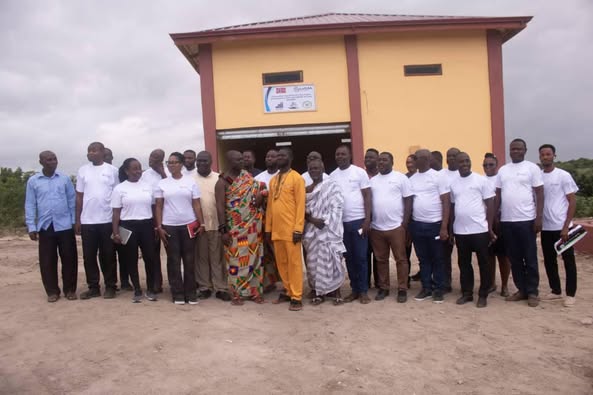On August 20, 2024, a 150-tonne capacity ultra-modern warehouse was officially commissioned for farmers in Nsuekyir, Effutu Municipality, in the Central Region. Funded by the Norwegian Government, the Local Climate Adaptive Living (LoCal) Facility, and the United Nations Capital Development Fund (UNCDF), the warehouse aims to serve as a storage hub for local farming communities. This project was implemented in partnership with the Ministry of Local Government, Decentralization, and Rural Development.
The warehouse is designed to help reduce post-harvest losses, a persistent challenge for farmers in the Effutu area. It features a drying platform for proper grain handling, a borehole to provide water for farmers, and adequate storage space for farm commodities like maize. The facility is part of a broader initiative under UNCDF’s Local Climate Adaptive Living Facility to promote climate-smart agriculture and sustainable economic development.
Effutu Municipal Chief Executive, Hon. Alhaji Zubairu Kassim, expressed gratitude to the donors and highlighted the warehouse’s importance in tackling post-harvest losses, which he described as a significant barrier to agricultural growth and farmers’ livelihoods. He also urged farmers to use and maintain the facility properly.
Other contributors, including Madam Linda Agyepong from the Ministry of Local Government and Madam Angela Yayra Kwashie from UNCDF, emphasized the project’s focus on addressing climate change and fostering resilient agricultural practices. The initiative also includes community sensitization on climate-smart agriculture and training programs for women in soap-making, complete with start-up kits.
Critique: Missed Opportunity for Youth Employment
While the warehouse is undoubtedly a valuable addition to Effutu’s agricultural infrastructure, one cannot help but question whether the funds could have been used more strategically to address broader economic challenges in the community. Over the past three years, Development Partners Assessment Tool (DPAT) performance grants have averaged just under $80,000 per MMDA, yet these resources are often directed toward projects with limited long-term economic impact.
Rather than focusing solely on storage facilities, which benefit only a segment of the population, the funds could have been invested in establishing a factory or processing plant. Such an initiative could create jobs for the youth in Effutu, tackling the area’s high unemployment rate while simultaneously supporting farmers by providing a ready market for their produce.
A factory could process agricultural commodities like maize into flour, animal feed, or other value-added products, thereby diversifying the local economy and promoting industrialization. This would have a ripple effect, stimulating other sectors and creating opportunities for both skilled and unskilled labor.
By prioritizing warehouses over factories, projects like this risk addressing only one piece of the puzzle. While reducing post-harvest losses is essential, so is ensuring that farmers and their communities have access to economic opportunities beyond agriculture.
Looking Forward
Efforts to support agriculture and climate resilience are commendable, but stakeholders must adopt a more holistic approach to community development. Projects like factories not only support farmers but also provide much-needed employment for the youth, fostering long-term economic growth.
As we celebrate the commissioning of this warehouse, we must also reflect on how resources are allocated and strive to invest in initiatives that create lasting, transformative change for communities like Effutu.


























